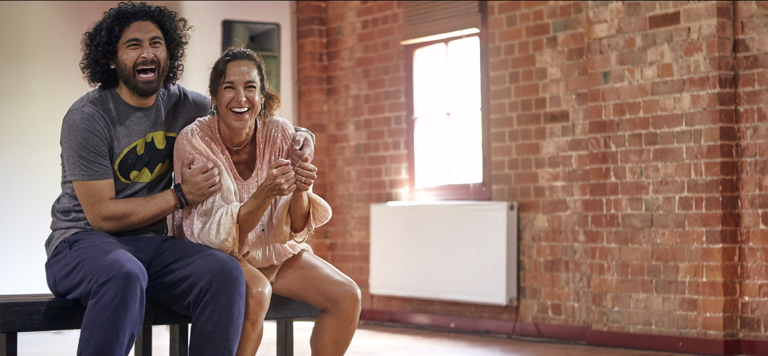Our Approach
The Programming Pyramid
Malthouse Theatre is a new work company. We make work in a wide variety of ways, collaborating with local and international artists to create inventive performances that cut to the core of the human experience.
Some productions have been commissioned and developed in-house through the Engine Room, while others are developed elsewhere. We also present work in partnership with other companies and festivals, rounding out a curated season of high quality work that speaks to a range of established and new audiences.
The productions you see on our stage are just the tip of a complex iceberg—or the thin end of the wedge, depending on which way you look at it. Everything we make is artist-led, and there’s a huge amount of work that goes on behind the scenes supporting artists and their work, to make each year’s program possible.
And while we can’t always share the ins and outs of how and why a work did or didn’t reach production with us, we do want to share some reflections on how the process plays out from our end.

Relationships
Relationships are the foundation of everything we do. With artists, with audiences, with other companies, with donors and partners—relationships of all types are the connective tissue that makes anything in theatre possible. As an artistic and programming team, relationships tend to be where we spend the biggest share of our time.
Coffees, conversations, reading widely, seeing shows, getting to know the work of artists who might be what we’re looking for, and them getting to know us. We never know where any of it might go, and some conversations need years of gestation before they progress—but when the right idea does emerge, it’s the many relationships around it that will carry it forward.
As an artist, you’ll recognise the importance of getting to know potential collaborators, away from the pressure of an outcome. So my advice to independent artists is to be upfront, professional, and open-ended in the way you approach connecting with theatre companies. Introduce yourself, invite us to your work, and get to know ours too. And while relationships are important, the work itself will always be your best calling card.
Ideas
We’re always looking for project ideas that will make a pertinent contribution to our future programming. We pride ourselves on making work that is innovative or provocative or a meaningful new contribution to culture, so we spend a lot of time sifting through scripts and projects proposals in search of the ones we believe will do that.
Ideas are more than words and aspirations. They might start there, but then we need them to take shape into something solid, distinctive, and compelling enough to stand out. It can take years to develop a work—so we need ideas with the integrity, depth and durability to withstand that scrutiny, and resonate now and into the future.
Being able to articulate your ideas is one of the major skills artists develop. Think form, content, structure, process, context—distilling the many dimensions of a project down to what’s central and distinctive to this work.
Projects
The project stage is the point where an idea gets some practical investment in it. Whether it’s a draft, a workshop, a laboratory-style experiment, we start putting resources into progressing the concept to see if and how it works.
There are always a whole host of projects on our slate at various stages of growth. Like any company that genuinely believes in innovation, we know that not every experiment will become a viable product. While we’re always aiming towards making work for Malthouse Theatre's stages, we also know the R&D work we do has a wider impact in contributing to a creative culture.
For artists, there’s often an imperative to get your work onto the stage as quickly as possible. But theatre is a process, and the integrity of artistic exploration, experimentation and creative rigour can’t be fudged or rushed. That feeds back into the relationship building aspect, with each project contributing to a shared body of knowledge, and laying the groundwork for future conversations.
Productions
At the end (or the pinnacle) of all of our processes comes the annual Season of productions that audiences know us for. We tend to program on an annual cycle, announcing in September the suite of mainstage work we’ll do the following year. And if you’ve read this far, you’ll have a sense of the myriad ways in which projects make it into our program, and can imagine the volume of projects, scripts, pitches and proposals that pass across our desk.
In our experience, some productions can come together quite quickly—you meet an artist who pitches a project that perfectly fits the bill. But more often than not they are the result of years of wandering conversations, false starts and failed experiments until the right factors converge to enable the right idea.
So while the focus for many artists is on getting their work produced, it’s worth knowing that there’s no singular path for getting there. And when do you see an original work on a Malthouse Theatre stage that’s like nothing you’ve seen before, know that it’s not just the genius of the artist or the brilliance of that perfect play, but a whole web of work that got it there.
Final thoughts
We hope this breakdown gives useful context to how we approach our work, and a glimpse into the kind of groundwork that goes into commissioning, develop, curating, producing original theatre.
For artists and companies alike, the proof is always in the work itself. Introduce yourself, tell us about your practice, and invite us to your work. We can’t read or see everything that comes our way, but we’re genuinely always on the lookout for new artists and new voices, and the projects that might prove to be the future of what we do.
You can reach us at artistic@malthousetheatre.com.au
